Nissan Leaf vs VW Golf Variant – Differences & prices compared
Compare performance, boot space, consumption and price in one view.
Find out now: which car is the better choice for you – Nissan Leaf or VW Golf Variant?
The Nissan Leaf (Hatchback) comes with a Electric engine and Automatic transmission. In comparison, the VW Golf Variant (Estate) features a Petrol MHEV, Petrol or Diesel engine with Automatic or Manuel transmission.
When it comes to boot capacity, the Nissan Leaf offers 394 L, while the VW Golf Variant provides 611 L – depending on how much space you need. If you’re looking for more power, decide whether the 217 HP of the Nissan Leaf or the 333 HP of the VW Golf Variant suits your needs better.
In terms of consumption, the values are 16.70 kWh per 100 km for the Nissan Leaf, and 4.30 L for the VW Golf Variant.
Price-wise, the Nissan Leaf starts at 30800 £, while the VW Golf Variant is available from 25200 £. Compare all the details and find out which model fits your lifestyle best!
Nissan Leaf
The Nissan Leaf stands out as a pioneering model in the realm of electric vehicles, known for its impressive blend of practicality and eco-friendliness. It offers a smooth and quiet driving experience, making it an ideal choice for city commuting and longer journeys alike. The interior design is both comfortable and intuitive, providing drivers with a sense of modernity and ease of use.
details @ germany.nissannews.com
@ germany.nissannews.com
 @ germany.nissannews.com
@ germany.nissannews.com
 @ germany.nissannews.com
@ germany.nissannews.com
 @ germany.nissannews.com
@ germany.nissannews.com
VW Golf Variant
The VW Golf Variant represents a seamless blend of practicality and style, catering to drivers who require extra space without compromising on aesthetics. Its refined design and spacious interior make it an ideal choice for families and individuals with an active lifestyle. With advanced technology and a smooth driving experience, this estate car continues to impress within its class.
details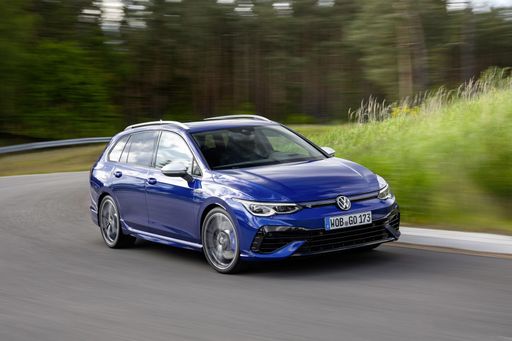 @ Volkswagen
@ Volkswagen
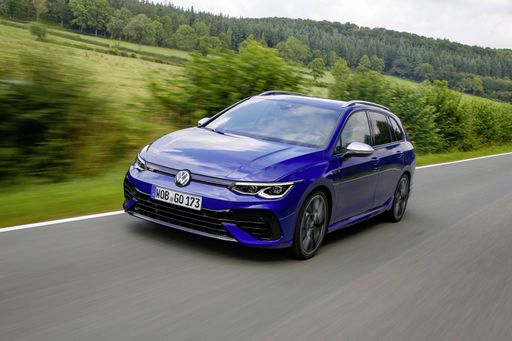 @ Volkswagen
@ Volkswagen
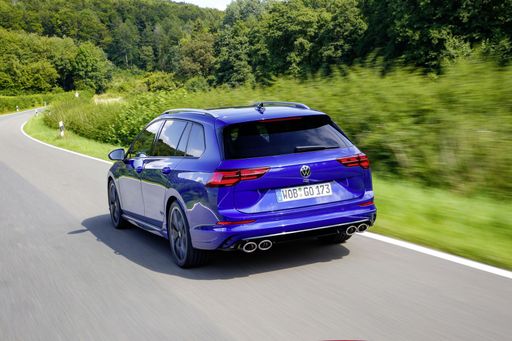 @ Volkswagen
@ Volkswagen
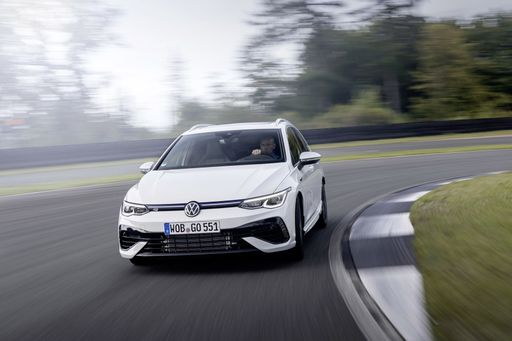 @ Volkswagen
@ Volkswagen
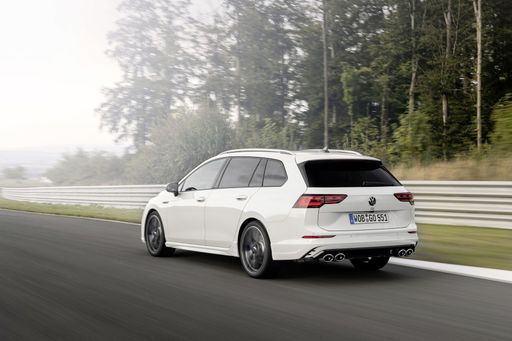 @ Volkswagen
@ Volkswagen
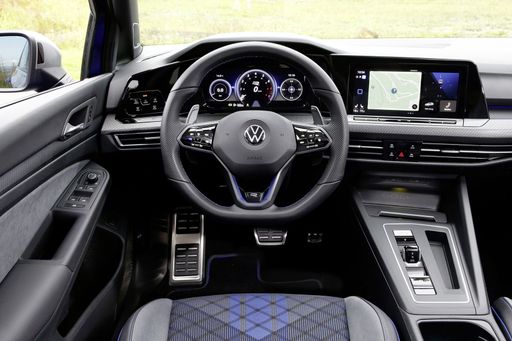 @ Volkswagen
@ Volkswagen
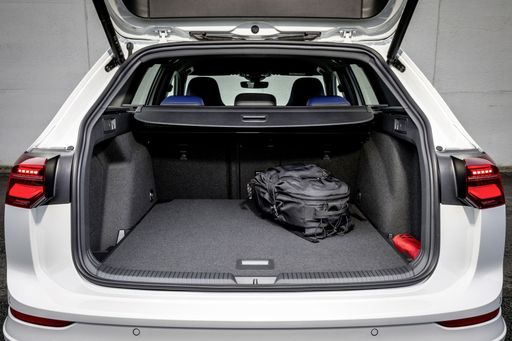 @ Volkswagen
@ Volkswagen

|

|
|
|
|
Costs and Consumption |
|
|---|---|
|
Price
30800 - 37200 £
|
Price
25200 - 48200 £
|
|
Consumption L/100km
-
|
Consumption L/100km
4.3 - 8.2 L
|
|
Consumption kWh/100km
16.7 - 17.8 kWh
|
Consumption kWh/100km
-
|
|
Electric Range
270 - 385 km
|
Electric Range
-
|
|
Battery Capacity
39 - 59 kWh
|
Battery Capacity
-
|
|
co2
0 g/km
|
co2
114 - 185 g/km
|
|
Fuel tank capacity
-
|
Fuel tank capacity
45 - 55 L
|
Dimensions and Body |
|
|---|---|
|
Body Type
Hatchback
|
Body Type
Estate
|
|
Seats
5
|
Seats
5
|
|
Doors
5
|
Doors
5
|
|
Curb weight
1580 - 1756 kg
|
Curb weight
1366 - 1621 kg
|
|
Trunk capacity
385 - 394 L
|
Trunk capacity
611 L
|
|
Length
4490 mm
|
Length
4631 - 4651 mm
|
|
Width
1788 mm
|
Width
1789 mm
|
|
Height
1540 - 1545 mm
|
Height
1462 - 1487 mm
|
|
Payload
384 - 415 kg
|
Payload
489 - 547 kg
|
Engine and Performance |
|
|---|---|
|
Engine Type
Electric
|
Engine Type
Petrol MHEV, Petrol, Diesel
|
|
Transmission
Automatic
|
Transmission
Automatic, Manuel
|
|
Transmission Detail
Reduction Gearbox
|
Transmission Detail
Dual-Clutch Automatic, Manual Gearbox
|
|
Drive Type
Front-Wheel Drive
|
Drive Type
Front-Wheel Drive, All-Wheel Drive
|
|
Power HP
150 - 217 HP
|
Power HP
116 - 333 HP
|
|
Acceleration 0-100km/h
6.9 - 7.9 s
|
Acceleration 0-100km/h
4.8 - 10.5 s
|
|
Max Speed
144 - 157 km/h
|
Max Speed
202 - 250 km/h
|
|
Torque
320 - 340 Nm
|
Torque
220 - 420 Nm
|
|
Number of Cylinders
-
|
Number of Cylinders
4
|
|
Power kW
110 - 160 kW
|
Power kW
85 - 245 kW
|
|
Engine capacity
-
|
Engine capacity
1498 - 1984 cm3
|
General |
|
|---|---|
|
Model Year
2019
|
Model Year
2024 - 2025
|
|
CO2 Efficiency Class
A
|
CO2 Efficiency Class
D, C, G, F
|
|
Brand
Nissan
|
Brand
VW
|
Nissan Leaf
Introduction to the Nissan Leaf: A Pioneer in Electric Mobility
The Nissan Leaf has established itself as a trailblazer in the realm of electric vehicles (EVs) since its launch. As we delve into its present-day iterations, the Leaf continues to soar in popularity due to remarkable advancements in technology and sustainability. Let's explore what makes the Nissan Leaf a standout in today's automotive market.
Power and Performance: Under the Hood of the Nissan Leaf
The Nissan Leaf boasts a power output ranging from 150 to 217 PS, depending on the battery option chosen. The vehicle's electric motor, a product of cutting-edge engineering, offers instant torque ranging from 320 to 340 Nm, resulting in impressive acceleration capabilities. The 0 to 100 km/h dash is achieved in as little as 6.9 seconds, showcasing its prowess in electric performance.
Battery Technology: Efficient Energy Management
When discussing the Nissan Leaf, battery technology is at the forefront. The available battery capacities range from 39 to 59 kWh, supporting an electric range between 270 to 385 km. This flexibility allows drivers to choose a model that best fits their driving habits, providing peace of mind for longer journeys without frequent recharging.
Sustainability: The Environmental Edge
One of the primary attractions of the Nissan Leaf is its commitment to sustainability. As an all-electric vehicle, it produces zero CO2 emissions, placing it in the top tier of the CO2-efficiency class with an 'A' rating. This clean energy approach contributes significantly to reducing environmental impact and supports Nissan's drive towards a greener future.
Design and Comfort: Aesthetic Appeal and Practicality
The Nissan Leaf is not just about efficiency; it's also designed for comfort and utility. With its sleek hatchback body and dimensions of 4490 mm in length, 1788 mm in width, and a height of up to 1545 mm, it offers ample interior space. The boot capacity ranges from 385 to 394 litres, providing sufficient storage for everyday needs. The model accommodates five passengers comfortably, ensuring a pleasant ride for everyone.
Innovations and Safety: Advanced Features for Peace of Mind
Nissan equips the Leaf with an array of intelligent features that enhance safety and convenience. The available equipment lines, including N-CONNECTA, Tekna, e+ N-CONNECTA, and e+ Tekna, offer varying levels of technology integration. ProPILOT Assist, e-Pedal, and a comprehensive suite of driver-assistance technology are just a few examples that highlight Nissan's commitment to innovation in the EV market.
Conclusion: The Nissan Leaf Continues to Lead
With prices ranging from €35,900 to €43,400, the Nissan Leaf remains an attractive choice for those looking to embrace electric mobility. It perfectly balances performance, design, and sustainability, making it a compelling choice in the competitive EV landscape. The Nissan Leaf not only represents the future of driving but also reinforces why it continues to be a leader in the electric vehicle community.
VW Golf Variant
The Versatile Allure of the VW Golf Variant
The VW Golf Variant continues to solidify its place in the automotive world as a resourceful and reliable estate car, sweeping across European roads with its sleek design and robust engineering. In the 2024 model year, VW introduces a range of technical enhancements and innovative features that elevate this standard bearer of practicality and performance.
Powertrains: Efficiency Meets Performance
Under the bonnet, the VW Golf Variant offers an impressive variety of powertrains designed to satisfy varying needs and driving conditions. From the refined 1.5 TSI petrol engines, available in manual and dual-clutch automatic transmission options, to the fuel-sipping 2.0 TDI diesel variants, the Golf Variant aims to strike a balance between performance and economy. Petrol mild-hybrid configurations further enhance efficiency, offering a smart blend of power delivery and reduced CO2 emissions.
Engine Specifications and Fuel Consumption
The power range spans from 116 PS in the entry-level models up to a robust 333 PS in the Volkswagen Golf Variant R, catering to those with a craving for speed and agility. Fuel consumption varies according to engine choice, starting as low as 4.4 L/100km for the efficient diesel models. Such performance is complemented with low CO2 emissions, aligning the vehicle with modern environmental standards.
Innovative Features and Technology
VW’s iconic estate car thrives on technology-driven advancements. With seamless integration of an advanced infotainment system and digital cockpit, driving becomes both intuitive and enjoyable. The variety of safety features, such as adaptive cruise control and lane-keeping assist, ensure confidence behind the wheel. Embracing a future-forward approach, the mild-hybrid variants introduce energy recuperation systems that optimise fuel usage, showcasing VW's commitment to sustainability.
Interior Comfort and Practicality
The VW Golf Variant is synonymous with comfort and spaciousness. With a commodious boot space of 611 litres, it accommodates families and professionals alike, making it an ideal choice for long journeys and everyday errands. High-quality materials adorn the interior, providing drivers and passengers with a sophisticated and comfortable environment.
Performance and Driving Dynamics
Driving enthusiasts will appreciate the Variant’s dynamic handling, facilitated by an array of engine choices and drivetrain configurations. Whether it's the front-wheel-drive versions that offer exceptional maneuverability or the 4MOTION all-wheel-drive option in the R variant providing enhanced traction, the Golf Variant promises an engaging driving experience.
Conclusion: A Staple for Modern Motoring
The 2024 VW Golf Variant stands as a testament to VW's legacy of developing cars that combine practicality, performance, and cutting-edge technology. Whether it is serving as a family car or a dynamic commuter, its various configurations ensure that it remains a formidable choice for a wide array of drivers.
The prices and data displayed are estimates based on German list prices and may vary by country. This information is not legally binding.
